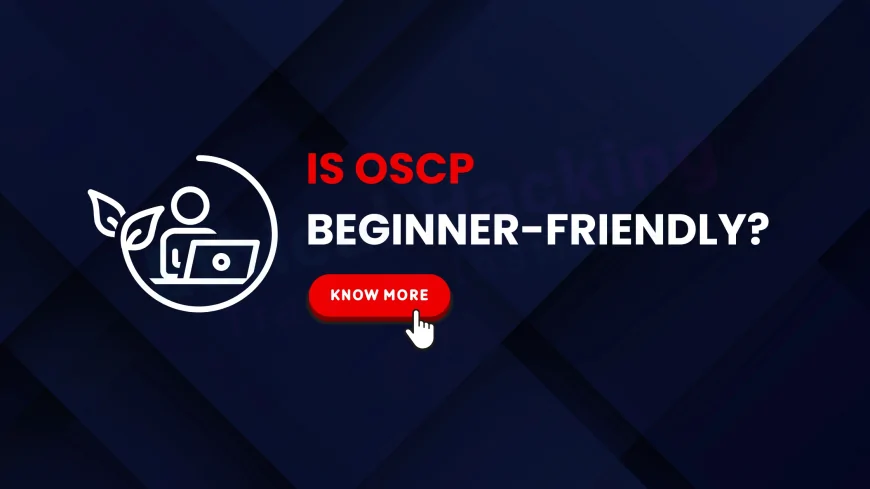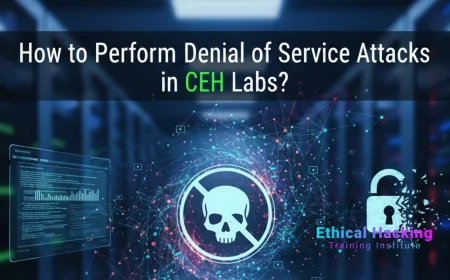Is OSCP Suitable for Beginners? A Complete Guide to Starting Your Cybersecurity Journey
The OSCP (Offensive Security Certified Professional) is a well-respected penetration testing certification, but many wonder if it's suitable for beginners in cybersecurity. This blog explores the foundational knowledge required, such as Linux, networking, and scripting, and offers a roadmap for beginners to prepare for the challenging OSCP exam. By focusing on hands-on practice and learning key penetration testing tools, even those new to the field can work towards achieving the OSCP certification. Additionally, this guide provides tips on how to approach the course and successfully navigate the exam.

The Offensive Security Certified Professional (OSCP) certification is one of the most coveted in the field of ethical hacking and penetration testing. However, one of the most frequently asked questions is: Is OSCP suitable for beginners? This question is particularly relevant as the course is known for its hands-on, practical approach to cybersecurity, which can be daunting for those just starting their journey in this field.
In this blog, we will explore whether the OSCP certification is appropriate for beginners, what it involves, and how to prepare if you're new to cybersecurity. We will also discuss the skills and knowledge you should have before attempting the OSCP exam and provide tips for successfully navigating this challenging certification.
What is the OSCP Certification?
The OSCP is a challenging ethical hacking certification offered by Offensive Security. It validates a candidate’s ability to perform penetration testing and ethical hacking in real-world environments. The certification is earned by completing the Penetration Testing with Kali Linux (PWK) course, followed by a 24-hour practical exam that includes exploiting machines and a detailed report submission.
OSCP is widely respected in the cybersecurity community for its practical, hands-on nature, focusing on real-world penetration testing skills. However, it is also known for its difficulty, making it a question mark for beginners in cybersecurity.
Is OSCP Suitable for Beginners?
The answer to this question depends on the individual’s background and understanding of key concepts in cybersecurity. While the OSCP course is designed to teach practical skills, it assumes that learners already have a foundational understanding of certain areas of IT and security.
Key Areas Required for OSCP Success
1. Basic Knowledge of Linux
The OSCP heavily relies on Linux for penetration testing and exploitation. If you're a beginner and don't have experience with Linux, this will be a significant challenge. Basic tasks like navigating the terminal, managing files, and configuring network settings are essential for success.
2. Understanding of Networking and TCP/IP
A solid grasp of TCP/IP networking is crucial for penetration testing. Understanding concepts like IP addresses, subnetting, ports, protocols, and how the OSI model works will be essential for scanning networks, identifying vulnerabilities, and exploiting systems.
3. Basic Scripting Skills
Though the OSCP does not require expert-level scripting knowledge, a basic understanding of Bash scripting or Python is highly beneficial. Many penetration tests require automation of repetitive tasks, which scripting can help with.
4. Knowledge of Web Application Security
The OSCP exam includes several web application vulnerabilities like SQL injection, cross-site scripting (XSS), and file inclusion vulnerabilities. A foundational understanding of how web applications work and how to exploit common web vulnerabilities is essential.
5. Familiarity with Tools
The OSCP uses tools such as Nmap, Metasploit, Burp Suite, and Netcat. Although the course will teach you how to use these tools, prior exposure to them will make the learning process smoother.
How to Prepare for the OSCP if You Are a Beginner
Even if you are new to cybersecurity, the OSCP is achievable with the right preparation. Here’s how to prepare effectively:
1. Gain Basic IT Knowledge
Start by building a foundation in networking and Linux. There are many free and paid resources available that cover topics like the Linux command line, basic networking, and TCP/IP fundamentals. Consider courses on platforms like Coursera, Udemy, or edX for an introduction to these topics.
2. Focus on Virtual Labs and Practice
The PWK labs are a great place for beginners to start hands-on practice. They provide a safe environment where you can practice penetration testing techniques on various machines. Try to solve the challenges without using automated tools, as this will help you understand the core concepts better.
3. Build Lab Environments
If you’re not yet comfortable with penetration testing tools and techniques, you can start by setting up personal lab environments. Tools like Kali Linux, Metasploit, and Wireshark are widely used in penetration testing. Setting up and practicing on your own virtual machines will give you a head start.
4. Learn Web Application Security
Many beginners overlook web security, but it’s a crucial part of the OSCP exam. Learn about the OWASP Top 10 vulnerabilities, which are commonly tested in the exam. Platforms like Hack The Box or TryHackMe offer beginner-friendly challenges focused on web application security.
5. Work on Your Report Writing
One of the most challenging aspects of the OSCP exam is the reporting. You’ll need to document your findings in a professional manner. Practice writing clear and concise reports, and make sure you understand how to capture and present technical information in a structured way.
Can Beginners Pass the OSCP Exam?
While the OSCP is not specifically designed for beginners, it is definitely possible to pass with sufficient preparation and dedication. Many learners without prior penetration testing experience have successfully completed the OSCP certification by:
-
Studying consistently
-
Working through the PWK course material and labs
-
Seeking help from online communities and forums
-
Practicing on other platforms such as Hack The Box, TryHackMe, or VulnHub
Success Stories of Beginners
Many OSCP candidates have shared their success stories about how they transitioned from novice to certified ethical hacker. With consistent effort, persistence, and structured learning, beginners can take on the challenge of the OSCP and succeed.
What’s the Next Step After OSCP?
After earning the OSCP, your career opportunities in ethical hacking, penetration testing, and cybersecurity consulting expand dramatically. You’ll be recognized as having practical, hands-on expertise that’s highly sought after in the cybersecurity industry.
Beyond OSCP, you can pursue other certifications like:
-
Offensive Security Wireless Professional (OSWP)
-
Certified Ethical Hacker (CEH)
-
Certified Information Systems Security Professional (CISSP)
Conclusion
While the OSCP certification is not specifically designed for absolute beginners, it is certainly within reach with the right preparation and dedication. If you have a basic understanding of Linux, networking, and scripting, and you’re willing to put in the effort to learn through hands-on practice, the OSCP is a highly rewarding challenge.
Starting with foundational knowledge, practicing in virtual environments, and gradually progressing through the PWK course will equip you with the skills necessary to succeed. The OSCP offers an unparalleled opportunity to launch your cybersecurity career and demonstrate your capabilities to employers.
FAQs
What is OSCP?
OSCP is the Offensive Security Certified Professional certification, focusing on practical penetration testing skills.
Is the OSCP exam suitable for beginners in cybersecurity?
The OSCP exam is challenging, but beginners with the right foundational knowledge and preparation can succeed.
What skills are required for OSCP?
Basic knowledge of Linux, networking, scripting (Python/Bash), and web application security is required.
Do I need prior experience to attempt the OSCP exam?
Prior experience in ethical hacking, penetration testing, and network security is beneficial but not mandatory.
What is the PWK course in OSCP?
The Penetration Testing with Kali Linux (PWK) course is the official training program for OSCP certification.
Can I start the OSCP certification as a beginner?
Yes, beginners can start OSCP if they have basic IT knowledge and a strong willingness to learn.
How long does it take to prepare for the OSCP exam?
The preparation time varies, but most beginners need 3-6 months of consistent study and practice to pass the exam.
What should a beginner focus on before starting OSCP?
Focus on building skills in Linux, networking basics, and penetration testing tools.
What are the basic prerequisites for OSCP?
Knowledge of Linux, basic networking, and scripting is essential before taking the OSCP course.
Is there a need for programming knowledge to pass OSCP?
A basic understanding of programming, especially in Python or Bash scripting, is helpful but not required.
Is OSCP harder than other cybersecurity certifications?
OSCP is considered one of the most challenging certifications due to its practical, hands-on exam format.
How can beginners get better at penetration testing?
Practice on virtual labs, CTFs (Capture the Flag) challenges, and platforms like TryHackMe or Hack The Box.
Can I prepare for OSCP without previous cybersecurity experience?
Yes, but it’s recommended to first get a basic understanding of networking and Linux before starting.
Is OSCP suitable for a career switch into cybersecurity?
Yes, the OSCP is a great certification for anyone looking to switch to a career in penetration testing or ethical hacking.
What are the main components of the OSCP course?
The course includes theory, hands-on labs, and exercises focusing on penetration testing techniques, tools, and reporting.
Can beginners pass the OSCP exam without external help?
Many beginners pass by diligently working through the course material, lab exercises, and self-study. However, joining forums and community discussions can be helpful.
What are some alternative certifications for beginners?
If OSCP seems too advanced, consider starting with certifications like CompTIA Security+ or Certified Ethical Hacker (CEH).
How does the OSCP exam work?
The OSCP exam is a 24-hour practical exam where you must compromise machines in a test environment and submit a report.
What are the challenges of the OSCP exam?
The practical nature of the exam is its biggest challenge. It tests your ability to exploit vulnerabilities, escalate privileges, and document findings.
How can I improve my skills in penetration testing?
Use resources like online labs, CTF competitions, and open-source tools like Kali Linux to improve your skills.
Can I take the OSCP exam if I’m not proficient in Linux?
It is possible, but Linux proficiency is highly recommended for OSCP as much of the training and tools are Linux-based.
Is it necessary to complete the PWK course before attempting the OSCP exam?
Yes, the PWK course provides essential knowledge and hands-on experience that is crucial for the OSCP exam.
Can I take OSCP after completing a basic cybersecurity course?
Yes, but it’s important to have an understanding of key concepts like networking, Linux, and ethical hacking tools.
Are there study groups or forums for OSCP?
Yes, there are many OSCP forums, Reddit communities, and Discord channels where beginners can share tips and advice.
What resources can I use to prepare for OSCP?
In addition to the PWK course, use Hack The Box, TryHackMe, and VulnHub for hands-on practice.
How does OSCP compare to other cybersecurity certifications?
OSCP is more hands-on and practical compared to many other certifications, which often focus on theoretical knowledge.
How do I document my findings in the OSCP exam?
You must write a professional penetration testing report detailing your methods, findings, and evidence.
What’s the most difficult part of the OSCP exam for beginners?
Many beginners find the exploitation and reporting aspects challenging, especially when under time pressure.
How do I stay motivated during OSCP preparation?
Stay motivated by setting clear goals, practicing regularly, and connecting with other learners.
How does OSCP help with a career in ethical hacking?
OSCP is highly respected in the cybersecurity industry and significantly boosts your credibility as an ethical hacker or penetration tester.
Should I pursue OSCP or another cybersecurity certification first?
If you're a beginner, certifications like CompTIA Security+ or CEH might be better starting points, followed by OSCP.
What's Your Reaction?
 Like
0
Like
0
 Dislike
0
Dislike
0
 Love
0
Love
0
 Funny
0
Funny
0
 Angry
0
Angry
0
 Sad
0
Sad
0
 Wow
0
Wow
0

















